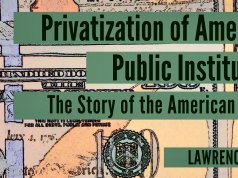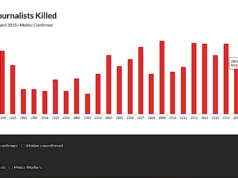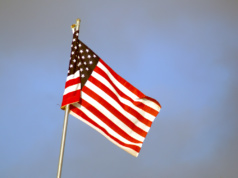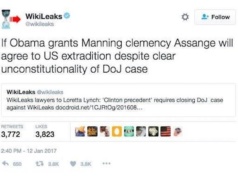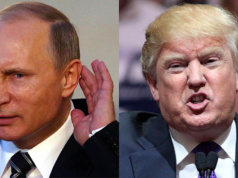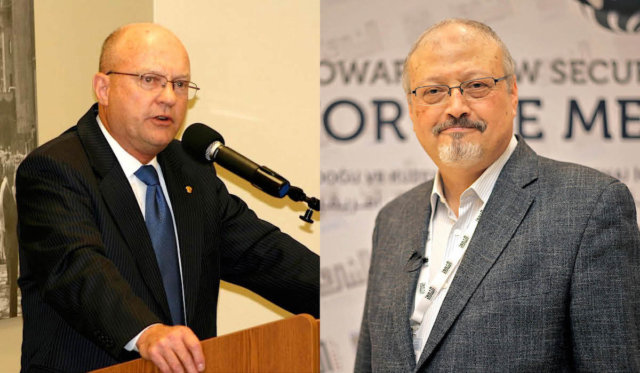
Retired Army Col. Lawrence Wilkerson is visiting Oklahoma for speaking engagements at two universities. He gave a lecture at the University of Oklahoma on Tuesday night, he will speak at Oklahoma State University luncheon at noon today, and he will visit the University of Central Oklahoma for a dinner and lecture tonight at 6 p.m.
Wilkerson sat down with NoDoc to discuss the murder of Saudi Arabian journalist Jamal Khashoggi, whose apparent death at the hands of Saudi operatives has sparked outrage among those who support a free press. (You can read Khashoggi’s final column for the Washington Post here, submitted before and published after his death.)
A veteran who served 31 years in the armed forces, Wilkerson has worked in various government positions, most notably as chief of staff for Secretary of State Colin Powell.
Wilkerson’s answers have been edited slightly for length.
In brief, what do you think people should know about the relationship between the U.S. and Saudi Arabia?
What I find all across the country, on college campuses even, where I would expect to find a more literate audience, if you would, is a very pronounced ignorance about the U.S. relationship with Saudi Arabia.
Whether it’s historical — they don’t know, for example, that it goes all the way back to [President Franklin Roosevelt] and the King (Abdul Aziz) sitting down and talking about how the future was going to unfold with Saudi oil and American power — to the present circumstances where Saudi Arabia is incontestably the greatest state sponsor of terrorism in the world.
We say daily that Iran is (terrorism’s greatest sponsor), when all Iran sponsors in the way of terrorism is Hezbollah and Hamas, who are both aimed at Israel. Which is why we take so much umbrage at Iran’s sponsorship of terrorism. The Saudis sponsor it all over the world, through everything from education processes to actual groups and money. Most Americans aren’t aware of that.
They became somewhat, through intuition maybe, aware of it post-9/11 because 15 of the 19 hijackers were Saudis. And so there got to be a beginning of a realization that this probably wasn’t the best relationship the United States had in the world. That culminated, in my view, in an instance most Americans, again, don’t know anything about. And that was the families — the survivors of the 9/11 tragedy — who brought a lawsuit against Saudi Arabia. And it winded its way through the court system and finally, because the court system was not impacted at that time by the Supreme Court, it finally made its way to New York and into a courtroom where they had the initial stages of the trial of Saudi Arabia. And guess whose side the U.S. Department of Justice sat on in the courtroom? Saudi Arabia’s. Not the American citizens, not the grieving family members.
That’s a sign of how poisonous and insidious, I think at least, this relationship with Saudi Arabia is. And this latest manifestation of it is Mohammad Bin Salman apparently ordered a takeout of Jamal Khashoggi.
And the alleged torture and murder of Khashoggi has scared people.
And yet, what I’ve been working on for the last six months is invoking the War Powers (Act). I’ve been working in the Senate, I’ve been working in the House. Now It’s Senate Special Resolution 54, of which [invokes] the War Powers Act to tell the president of the United States to stop supporting the brutal war in Yemen because we’re supporting the Saudis in that war. We’re refueling their aircraft, giving them intelligence and so forth.
In doing that, I encountered an incredible lack of interest in the Senate and the House. I even had one sitting senator look at me and say it was a niche issue and wasn’t worrying her. A niche issue? Thousands of people dying? The greatest humanitarian disaster since World War II, cholera outbreak unparalleled, famine — and we’re helping that, that brutal war? Which, by the way, the Saudis are losing.
So I was reminded when this issue broke, with the dismemberment of and shipping away of the body parts or whatever of Khashoggi, of a quote (Joseph) Stalin said: You murder one person, and it’s something — it’s murder. Makes the press. You kill a million, and it’s a statistic. It’s really stunned me how Washington — I don’t object to it at all — but how Washington has suddenly become aware of this very poisonous relationship with Riyadh through this one man’s death.
To you, is this another piece in a story that we know, or is this the straw that breaks the camel’s back?
That’s the big question. There’s so much money involved. When (Crown Prince of Saudi Arabia) Mohammad Bin Salman came to the United States, he brought billions of dollars with him. He bought American public relations firms, he got them to go to bat for him. So there’s just tons of money involved, there’s the oil involved, there’s all the influence of the military industrial complex.
This suddenly looks like it could be a break point, and it could be a change in the relationship. And all over this revelation, which more or less shows what’s been there all along, but made it more graphic and more dramatic.
We’re in the midst of an election year and the murder of a journalist in Turkey can seem like a very far-off issue. As a journalist and especially as a citizen who values a free press and is afraid, what sorts of things can we do or should we do to help hold those responsible accountable?
I tell my students: go vote. Do you know what the stats on your voting are, between 18 and 34? You don’t vote. Go vote, go and vote.
Vote absentee, register in this state, vote. And most of all, vote the bastards out. And I’m talking about everybody. I’m talking about (Nancy) Pelosi, (Chuck) Schumer, (Mitch) McConnell, everybody. Vote them all out, put some new, fresh young people in there who are more interested in the country than their own political power.
Is there anything else you’d like to say that I didn’t get a chance to ask you about?
Just that I think the war in Yemen should be the break point with Saudi Arabia. If we can’t get them to stop that war and force a political solution to stop the killing and the dying, if we can’t get that done, we should cut loose from Saudi Arabia. They can’t prosecute that war without us.











